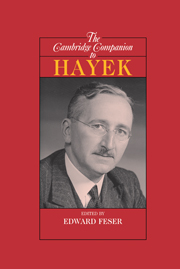Book contents
- Frontmatter
- Introduction
- 1 Hayek and the Austrian tradition
- 2 Hayek on money and the business cycle
- 3 Hayek and market socialism
- 4 Hayek and Marx
- 5 Hayek versus Keynes: the road to reconciliation
- 6 Hayek on knowledge, economics, and society
- 7 Hayek and Popper: the road to serfdom and the open society
- 8 Hayek’s politics
- 9 Hayek the philosopher of law
- 10 Hayek and liberalism
- 11 Hayek and conservatism
- 12 Hayek on the evolution of society and mind
- 13 Hayek on justice and the order of actions
- 14 Hayek the cognitive scientist and philosopher of mind
- Guide to Further reading
- Bibliography
- Index
9 - Hayek the philosopher of law
Published online by Cambridge University Press: 28 January 2007
- Frontmatter
- Introduction
- 1 Hayek and the Austrian tradition
- 2 Hayek on money and the business cycle
- 3 Hayek and market socialism
- 4 Hayek and Marx
- 5 Hayek versus Keynes: the road to reconciliation
- 6 Hayek on knowledge, economics, and society
- 7 Hayek and Popper: the road to serfdom and the open society
- 8 Hayek’s politics
- 9 Hayek the philosopher of law
- 10 Hayek and liberalism
- 11 Hayek and conservatism
- 12 Hayek on the evolution of society and mind
- 13 Hayek on justice and the order of actions
- 14 Hayek the cognitive scientist and philosopher of mind
- Guide to Further reading
- Bibliography
- Index
Summary
Although Friedrich Hayek received the greatest recognition for his work in economics, he wrote several books on political theory and jurisprudence (as well as other philosophical areas). His writings on law and the philosophy of law have been widely discussed in the last decade or so, and represent a crucial contribution to this area of philosophy. Although Hayek's degree was not in philosophy, his writings are clearly philosophical. Inasmuch as he writes about the law in a philosophical way, asking justificatory, methodological, and normative questions about the nature and practice of law and legal systems, he is writing as a philosopher of law.
THESIS VERSUS NOMOS
In his three-volume study Law, Legislation, and Liberty (1973, 1976b, 1979), Hayek makes a key distinction between what he calls thesis, the law of legislation, and nomos, the law of liberty. The former is imposed by the sovereign, in what Hayek describes as a top-down, coercive process; the latter is evolved, a spontaneously-emerging (or bottom-up) process. While thesis reflects primarily the interests of the sovereign (or ruling class generally), nomos arises out of human interaction – the many iterations of people seeking more effectively to coordinate their actions and to resolve disputes peaceably. (Some legal historians have argued that Hayek conflates common law and customary law, but this doesn’t undermine the thesis/nomos distinction.) As we shall see, Hayek argues that it is nomos that is critical for liberal political and economic theory.
- Type
- Chapter
- Information
- The Cambridge Companion to Hayek , pp. 171 - 181Publisher: Cambridge University PressPrint publication year: 2006
- 5
- Cited by



